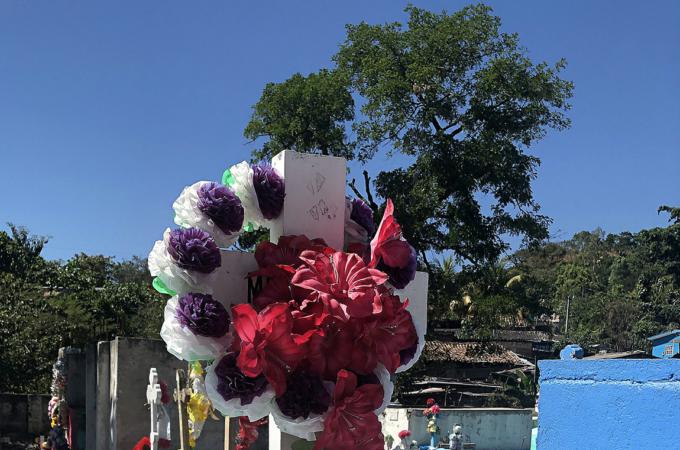Maryknoll Sisters remember murdered missionaries 40 years on
BRAINTREE -- On Dec. 2, the Maryknoll Sisters hosted a webinar to honor the lives and deaths of four American missionaries who were killed on that day 40 years earlier in El Salvador: Sister Ita Ford, MM, Sister Maura Clarke, MM, Sister Dorothy Kazel, OSU, and lay missionary Jean Donovan.
In the Diocese of Chalatenango, El Salvador, the women assisted in faith formation, distributed food supplies, and transported people in need of medical care. As the Salvadoran Civil War began and violence in the country increased, they helped internal refugees and taught young adults to find nonviolent ways to protest and effect change.
On Dec. 2, 1980, Donovan and Sister Dorothy drove to the airport to pick up Sister Maura and Sister Ita. On their way home, their minibus was stopped by military personnel. The four women were raped, murdered, and buried in a shallow grave, where their bodies were later recovered. Thousands of Salvadorans suffered similar fates during the country's civil war from 1979 to 1992.
The virtual memorial included songs, prayers, and a meditative dance. From around the world, friends, relatives, and colleagues of the four churchwomen, as well as missionaries who were influenced by them, shared video messages about their legacy. Some of the event's recurring themes were service to the poor, solidarity with the oppressed, the power of presence, and the universal call to bear witness to and participate in suffering.
Sister Claudette LaVerdiere, MM, a former president of the Maryknoll Sisters, spoke about the spirituality of her order's foundress, Mother Mary Joseph Rogers, regarding missions and martyrdom.
"She knew that while few of us would shed our blood, all of us were invited to love forever unconditionally," Sister Claudette said.
She quoted Mother Mary Joseph as having said, "It is the motive and spirit you have in accepting hardships, deprivations, mental trials and disappointments that make a martyr of you."
Ruth Ford, one of Sister Ita's 10 nieces and nephews, spoke about her aunt's legacy of resilience and the need for work like hers in the present day. Deirdre Keyhole, niece of Sister Maura, drew three lessons from her aunt's example: to love nature, to take time for prayer each day, and to get involved in one's community.
Sister Sheila Marie Tobbe, OSU, who knew Donovan and Sister Dorothy, spoke at length about their work and how they embodied the beatitudes.
"The continuing meaning of our martyrs' lives and heroic deaths must come through us, as we daily face the many critical challenges of our times, committing ourselves to the works of mercy and justice that they gave witness to," Sister Sheila Marie said.
Eileen Markey, a journalist, professor, and author of "Radical Faith: The Assassination of Sister Maura," spoke about what she has learned from the four women through her research.
She said she thought them similar to St. Veronica, daring "to be driven by empathy" and risk their own safety to help the oppressed. In this year full of struggle for racial justice, Markey said, she has come to see them as models of "radical solidarity."
Sister Norma Pocasangre, MM, a native of El Salvador, spoke about how the missionaries influenced her own vocation journey. She first learned about them when, at age 17, she read an article about the Salvadoran Civil War, and was struck by their story. Years later, she came into contact with the Maryknoll Sisters and was surprised to learn that two of the women were from that community.
In 2000, on the 20th anniversary of their deaths, Sister Norma went on a pilgrimage to the place where they were killed. She said that when she set foot there, she was filled with "a sense of wonder."
"I thought to myself, if these women, who are from another country, (had) come to serve my people when they were most in need, until the point of death, then why cannot I go to serve people who also are in need in other cultures?" Sister Norma said.
One notable speaker during the webinar was Sister Melinda Roper, MM, who was the president of the Maryknoll Sisters in 1980. She spoke of the "tension" she has felt "between suffering as problem to be solved and suffering as mystery to be embraced."
"Responding to suffering is at the heart of mission. The question is always how best to respond," Sister Melinda said.
The final segment of the webinar was a slideshow presented by Sister Margaret "Peg" Dillon, MM, who lived and worked with Sister Maura for 10 years in Nicaragua. She showed pictures of the various organizations that have been founded in honor of the four women, including schools, scholarships, and education centers across the United States.
"Now it is our turn. You and me. How do we go forward creating a future of kindness, of justice and peace, of presence to each other?" Sister Peg said.



















